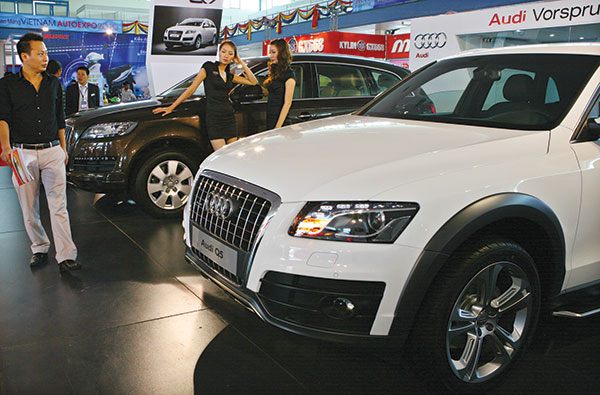Local car-makers bemoan special consumption tax

While local car-makers are up in arms over the proposed special consumption tax, car importers aren’t so concerned
Ho Manh Tuan, deputy general director of Honda Vietnam, said car-makers had just petitioned the Vietnam Automobile Manufacturers Association, the Ministry of Finance and the Ministry of Industry and Trade to change the application of a special consumer tax (SCT) on locally-assembled cars and imported cars.
Last month, car manufacturers in Vietnam also raised the concern at a meeting between the Vietnam Business Forum’s Automobile Working Group and relevant governmental bodies including the Ministry of Planning and Investment, the Ministry of Finance, the Ministry of Transport and the Ministry of Industry and Trade.
The concern was raised in a context where the Vietnamese government is revising its Special Consumer Tax Law for National Assembly approval within this year.
Currently, both locally-assembled cars and imported cars face an SCT rate ranging from 45 per to 60 per cent. But Tuan said the application of an identical SCT on locally-assembled and imported cars made local products less competitive.
According to local car-makers, the SCT on local cars integrates all the cost of production, insurance, freight, distribution investment, after-sales services and the car-maker’s profit margin. But the SCT on an imported car applies only to the imported price, excluding the distributor’s profit margin.
Gaurav Gupta, general director of GM Vietnam, who is also head of the Automotive Working Group of the Vietnam Business Forum – which is a biannual forum to bring together the business community to discuss matters of interest with the Vietnamese government - said the current application of the SCT was unfair to local car-makers as it widened the cost gap between local and imported cars.
Nguyen Anh Tuan, head of the Strategy Planning Division of Toyota Vietnam, estimated the price of a local car was 5 per cent higher than an imported alternative because of the different way the SCT was applied.
Although local car-makers have raised this concern for a long time, it seems likely their pleas remain ignored. In the latest draft of the revised Special Consumer Tax Law, the Ministry of Finance made no amendments to the issue. Local car producers are likely to continue to press their concerns in the run-up to the revised law being debated at the National Assembly.
If local car-makers are successful, the change could hurt car importers.
“The proposal [from local car-makers] is unexpected and would introduce an unfair advantage,” said Laurent Genet, general director of Automotive Asia Limited – the sole distributor of the Audi brand in Vietnam.
“Car importers support initiatives to make cars more affordable for Vietnamese customers. If this proposal was adopted we believe this would indicate that things are going in the opposite direction. We trust the Vietnamese authorities will continue with the fair application of the SCT,” said Genet.
He noted that Vietnam’s tax authorities were applying the SCT in a correct and fair way to both local and imported car players because the tax was imposed on the finished car value to the importer or distributor.
“That value includes all costs and profit margins – whether abroad or in Vietnam – required to deliver a finished car to the distributor for retail,” he said.
What the stars mean:
★ Poor ★ ★ Promising ★★★ Good ★★★★ Very good ★★★★★ Exceptional
Latest News
More News
- Site clearance work launched for Dung Quat refinery upgrade (February 04, 2026 | 18:06)
- Masan High-Tech Materials reports profit: a view from Nui Phao mine (February 04, 2026 | 16:13)
- Hermes joins Long Thanh cargo terminal development (February 04, 2026 | 15:59)
- SCG enhances production and distribution in Vietnam (February 04, 2026 | 08:00)
- UNIVACCO strengthens Asia expansion with Vietnam facility (February 03, 2026 | 08:00)
- Cai Mep Ha Port project wins approval with $1.95bn investment (February 02, 2026 | 16:17)
- Repositioning Vietnam in Asia’s manufacturing race (February 02, 2026 | 16:00)
- Manufacturing growth remains solid in early 2026 (February 02, 2026 | 15:28)
- Navigating venture capital trends across the continent (February 02, 2026 | 14:00)
- Motivations to achieve high growth (February 02, 2026 | 11:00)
















 Mobile Version
Mobile Version